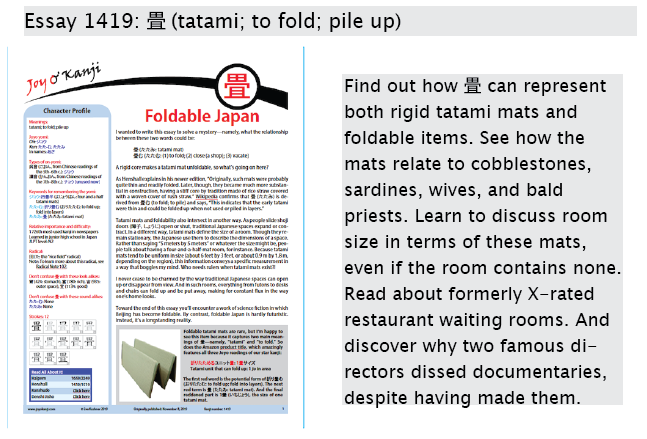Showering Someone with Questions
Let's start with a Quick Quiz. What could this phrase mean:
奇跡の一枚 (きせきのいちまい)
The first half, 奇跡, means "miracle," whereas 一枚 as いちまい represents "one thin, flat object" or "one sheet." Here are your choices:
a. miracle in which your significant other helps you change the sheets
b. "miracle" in which your significant other leaves you just one sheet and steals all the blankets
c. miracle in which the first draft of a text comes out perfectly
d. photo in which its subject looks much more attractive than their usual self
I'll block the answer with a preview of the newest essay:
The answer is d. That is, 奇跡の一枚 (きせきのいちまい) can mean "photo in which its subject looks much more attractive than their usual self." But this meaning is less common than the primary definition, "photo of a very rare scene." People use 奇跡の一枚 in this sense for incredible sports images, among many others.
That's what the phrase meant in a Facebook friend's jokey post about two pictures of her young daughter. The child initially looked beatific, then pouted for the camera, prompting her mother to write this:
奇跡の一枚
A miraculous photo:
エマの可愛さが伝わりつつ、最後に本性が出る
Emma looks so cute in the photo, but her true character eventually comes out
可愛さ (かわさ: cuteness); 伝わる (つたわる: to be transmitted); -つつ (while);
最後 (さいご: most recent); 本性 (ほんせい: true character); 出る (でる: to come out)
Q&A
Whereas that sentence was somewhat easy to grasp, I struggled more with this one, which appears in the new essay 1419 on 畳 and features the keyword 畳み掛ける (たたみかける: to press for an answer; shower questions on someone):
在庫はあるとの返事に、「何時までに届けられるか」と畳み掛けた。
On hearing that (the item) was available, I pressed for an answer about when it could be delivered.
在庫 (ざいこ: stock, inventory); 返事 (へんじ: reply); 何時 (いつ: when); 届ける (とどける: to deliver, shown here in its potential form)
I wondered who gave the answer referred to as 返事. My proofreader said that the sentence conveys this scenario:
Q1: Is this item available?
A1: Yes, we have it in stock.
Q2: When can it be delivered?
A2: Tomorrow.
So A1 is the relevant 返事, the answer that the item is in stock (i.e., 在庫はあるとの返事).
I'm going to present the sentence again so it's visible when I shower you with a second question:
在庫はあるとの返事に、「何時までに届けられるか」と畳み掛けた。
On hearing that (the item) was available, I pressed for an answer about when it could be delivered.
在庫 (ざいこ: stock, inventory); 返事 (へんじ: reply); 何時 (いつ: when); 届ける (とどける: to deliver, shown here in its potential form)
On seeing 何時, I would automatically pronounce it as なんじ and translate it as "what time?" But in this case 何時 (いつ: when) is appropriate. How do the Japanese indicate the proper yomi and therefore the intended meaning? With the use of furigana?
No, said my proofreader, context helps. If A2 (regarding the delivery time) is “by 10 p.m. tonight,” the 何時 in Q2 should be なんじ. But if this conversation takes place too late in the day, the 何時 should probably be いつ because the window for deliveries has already shut.
Without context, なんじ seems more likely, he added, because that's a Joyo yomi for each kanji and thus for the word as a whole.
Sentence Builder
On the subject of this sentence, I'm pleased to announce something very cool. Our partner Kanshudo has unveiled its newest game, Sentence Builder, enabling you to test yourself on the syntax of sample sentences such as the one we just examined. I've been wanting something like this for years so that all of us can engage even more deeply with the sample sentences in each essay, and Jonathan at Kanshudo has made that dream into a very well-presented reality. Kudos!
To make this content available to you on Kanshudo (both so you can play Sentence Builder and so that the site has plenty of sample sentences associated with a particular kanji), I need to enter each sample sentence into the system. After that, I check that it has supplied the right yomi for all kanji in the form of furigana. With the 在庫はある ... sentence, I was stunned to see that Kanshudo recognized the 何時 as いつ, rather than なんじ:

When I asked Jonathan how the system interpreted 何時 properly, he chalked it up to an algorithm he had created.
It looks like computers really are smarter than we are and will soon take over the world! Or maybe just Jonathan will!
All Dried Up
Here's a final thing I learned recently, this time during a Skype talk with my language partner Kensuke. We were chatting about the dehydration of foods as a way of preserving them (something I'd never thought about before), and he mentioned this word:
干物 or 乾物 (ひもの: dried fish (or shellfish, etc.))
In looking up the word, I glimpsed this spinoff:
干物女 (ひものおんな: young woman who has given up on love)
I laughed and told him about it, and then he laughed and said he had heard a colleague use the expression just that week.
I stared at the 干物 + 女 construction for a few moments before summoning up the courage to ask about it. He explained that when people say 干物女, they mean that the woman's spirit has dried up, not her vagina. Whew! Somehow that's a relief!
Catch you back here next time!
❖❖❖
Did you like this post? Express your love by supporting Joy o' Kanji on Patreon:



Comments